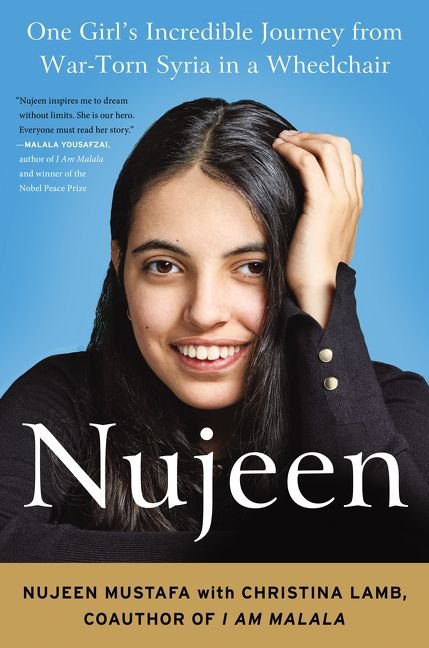Nujeen : One Girl's Incredible Journey from War-Torn Syria in a Wheelchair by Nujeen Mustafa with Christina Lamb (Harper)
“I don’t collect stamps or coins or football cars - I collect facts. Most of all I like facts about physics and space, particularly string theory. Also about history and dynasties like the Romanovs. And controversial people like Howard Hughes and J. Edgar Hoover”.
Nujeen Mustafa says she hates the word refugee more than any other word in the English language. She says what it really means is “a second-class citizen with a number scrawled on your hand or printed on a wristband, who everyone wishes would somehow go away.” In the year 2015, Nujeen “became a fact, a statistic, a number.” As much as she likes facts she goes on to say that “we are human beings.”
Nujeen is the story of one girl’s incredible journey from war-torn Syria in a wheelchair. It is written by Nujeen with Christina Lamb who was the coauthor of I Am Malala. Nujeen says her name means “new life”. Her parents already had four girls and four boys so her birth was rather unexpected. The age difference between her and her eldest brother is twenty-six years.
The family first lived in a town called Manbij in northern Syria, close to the border with Turkey. She calls her mother Ayee and her father Yaba. They are not Arabic words. Nujeen is a Kurd.
As one of the few Kurdish families living in a town that was mostly Arab who she says “looked down on us and called our area the Hill of the Foreigners”. The family was forced to speak Arabic. They could only use their own language, Kurmanji, in their home. It was most difficult for her parents who were illiterate and didn’t speak Arabic.
Nujeen was born with cerebral palsy. Her family moved to Aleppo so she could get better healthcare than she did in Manbij. Life was a little better. She even taught herself to speak a little English by watching the American soap opera Days of Our Lives.
The Syrian Civil War started after the Arab Spring Protests (a series of anti-government protests against corruption and economic stagnation). However, unlike other Arab nations that managed to depose their corrupt government officials, the President of Syria, Bashar al-Assad, used violent force to suppress the demonstrators.
This led to the Syrian Refugee Crisis where millions of Syrians left their country or have been displaced within their own nation. Nujeen is one of the millions of asylum seekers. She is an extraordinary young woman who escaped from Syria in a wheelchair. This is her story.
Nujeen is a Kurdish Syrian refugee who traveled from the historic city of Aleppo to escape war and civil unrest to Germany where her brother lives. She made the perilous journey in a wheelchair with her sister, who pushed her most of the way. Since leaving Aleppo, the girls travel more than 3,500 miles across nine countries from war to peace—a journey to a new life, just like her name. It takes them a month after they left Gaziantep in Turkey where her parents remained.
The trip cost nearly 5,000 Euros, mostly paid by her elder brothers who were already living abroad. Nujeen and her sister travel from Turkey to the Greek island of Lesbos in a dinghy. Then they go to Athens on the mainland of Greece, continuing to Macedonia and Serbia, with hopes of going through Hungary as well. However, their luck seems to run out as Hungary has closed its borders to all refugees. They have to change their plans. Their journey takes them through Croatia, Slovenia and Austria before they finally reach Germany.
Nujeen and other refugees not only leave the comforts of their home, they have to deal with smugglers, bribe corrupt officials, and are persecuted by right-wing fanatics. Yet Nujeen retains her sense of dignity. She’s an inspiration and a role model who shows the world that refugees are not all criminals and will contribute to society if that society lets them.
The Syrian refugee crisis still continues and Bashar al-Assad is still President of Syria. Now that the news is focusing on Russian aggression against Ukraine, people are seeming to forget the crimes committed by al-Assad and his regime. Why he is still in power is a mystery to me. Why can’t the international community depose people like al-Assad, Vladimir Putin, and all the other tyrants around the world. Until we rid the world of these people, the world will never be a safe place. ~Ernie Hoyt


